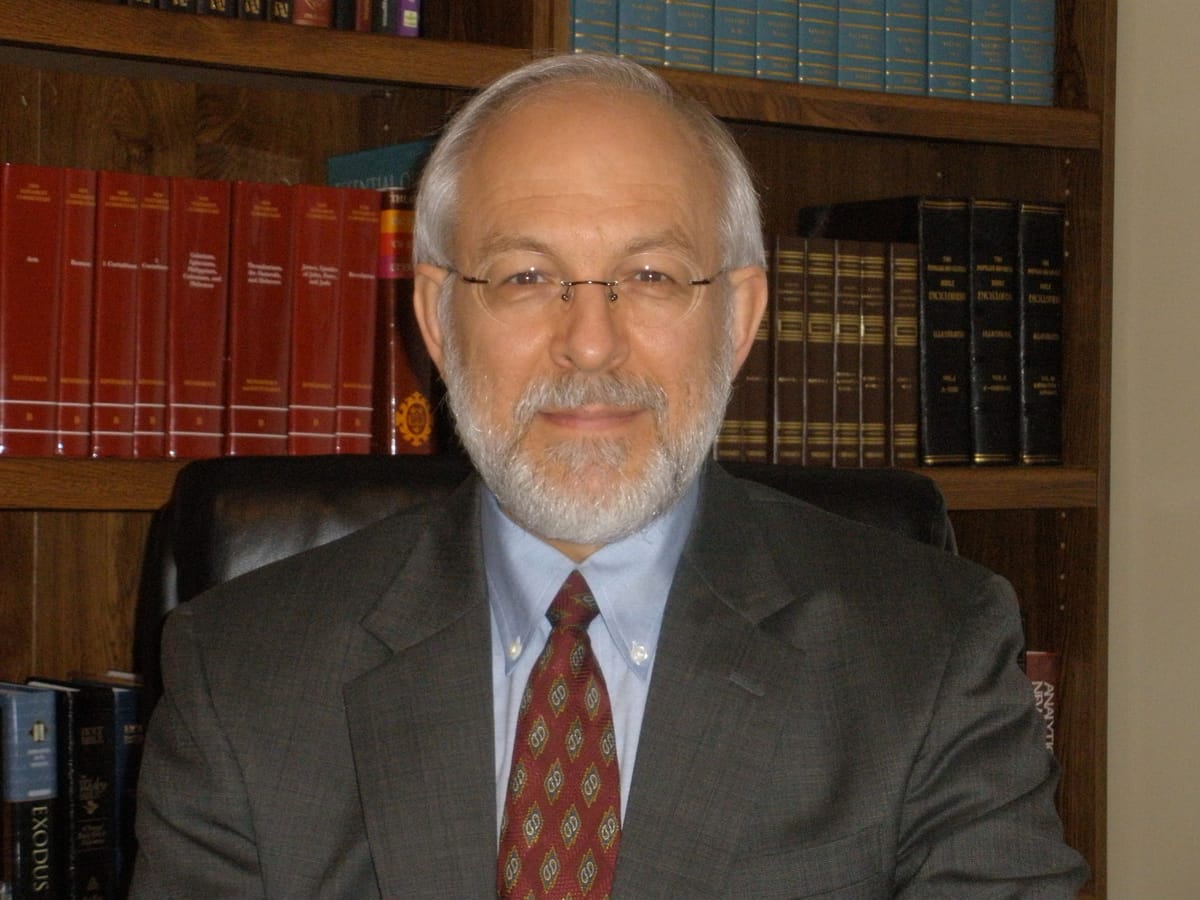Chapter 2, Section 3: The Doctrine of Inspiration cont’d.
The New Testament itself must be counted among the historical documentation of Christ. For example, Luke, a respected and learned physician and historian, wrote the Gospel of Luke and The Acts of the Apostles. He became intimately associated with Paul and many others of Christ’s disciples.
The British archaeologist and historian, Sir William Ramsey, attested to Luke’s accuracy in the minutest detail and validated Luke’s writing through his own archaeological endeavors.
In his gospel, notice how Luke opened his account of what happened regarding Jesus.
KJV Luke 1:1 Forasmuch as many have taken in hand to set forth in order a declaration of those things which are most surely believed among us,
2 Even as they delivered them unto us, which from the beginning were eyewitnesses, and ministers of the word;
3 It seemed good to me also, having had perfect understanding of all things from the very first, to write unto thee in order, most excellent Theophilus,
4 That thou mightest know the certainty of those things, wherein thou hast been instructed.
5 There was in the days of Herod, the king of Judaea, ….
Luke was therefore writing about an historical person named Herod, king of Judea. Notice similarly in Chapter 3, Luke writes about Herod and other notables:
Luke 3:1 Now in the fifteenth year of the reign of Tiberius Caesar, Pontius Pilate being governor of Judaea, and Herod being tetrarch of Galilee, and his brother Philip tetrarch of Ituraea and of the region of Trachonitis, and Lysanias the tetrarch of Abilene, ….
Once again notice that Luke is being very specific. He is doing things in order. He is giving dates, he is naming people, he is giving places, all of which exist in secular records. This is not myth. Contrast that with how we see that many myths begin: “Once upon a time, in a faraway place, there was a beautiful princess.” No names, no dates, no places. Luke’s account can be verified. And it does check out.
Turning back to Dr. David Noebel’s work, he summarizes the point we are making in this passage. QUOTE:
Jesus Christ was a historical figure. Furthermore, the honest critic must believe that the New Testament accurately describes His words and actions. Even without modern archaeological support of the New Testament, the character of Christ as, presented by the gospel writers, is too powerful and unique to be merely an exaggerated account.
The words and actions of Christ must be real; they are too incredible to have been fabricated. Humanist author, historian Will Durant recognizes this. He says, “That a few simple men should in one generation have invented so powerful and appealing a personality, so lofty an epic and so inspiring a vision of human brotherhood, would be a miracle far more incredible than any recorded in the gospels. After two centuries of higher criticism, the outlines of the life, character, and teaching of Christ do remain reasonably clear and constitute the most fascinating feature in the history of Western man.” END QUOTE
It would seem that there is no escape for the non-Christian. Not only is Christ a historical figure, but the Bible is a trustworthy historical document, and its revealed character of Christ is indisputably genuine. As one observer points out, “The unbeliever seems trapped by cold hard facts.”
Now if you are not inclined in the direction of typical Christianity, as was the case with me when I entered the Ohio State University, the most irritating aspect of the line of argumentation is probably this:
It depends in no sense on theology. He (Noebel) is talking about the historicity of Christ and the Bible. It does not depend on theology. It rests solely and squarely upon historical methods, the kind of methods all of us, whether Christians, rationalists, agnostics, or Tibetan monks have to use in analyzing historical data.
Therefore, with the New Testament now seen as an accurate historical record, we must face the facts of its evidence about Jesus the Christ. It says He rose from the dead, and it says that He was God in the flesh. Now remember, the circular reasoning charge from earlier in this chapter?
We are now tying it all together by the following logical progression to show how this confounds those who charge Bible believers with circular reasoning:
Step 1, the New Testament is an accurate historical record. We have given a few samples, not the full proof.
Step 2, the New Testament provides evidence that Christ is God.
Step 3, if Christ is God, then what He says is true, for He is an infallible authority.
Step 4, Christ, the infallible authority, in many instances (examples later) attested to the veracity of Scriptures. He stated that they were the Words of God.
Step 5, if the Bible is the Word of God, then it is all true, because God does not lie.
By the way, we once again see demonstrated in those five steps, the incredible importance of the doctrine of the Deity of Christ. If Christ is not God, it all falls apart.
As you read the Bible, you will come across many things, not only what Christ stated about the Scriptures, but also that which the Bible says about itself in many places. Here follows a few specifics about what the Bible says about itself:
It speaks of how the inspiration of the Bible is expressed in the Bible, because hundreds of times it has words like these: “Thus saith the LORD [Yahweh].”*
We find examples in Jeremiah:
Jeremiah 13:1 Thus saith the LORD [Yahweh] unto me, Go and get thee a linen girdle, and put it upon thy loins, and put it not in water
Another phrase:
Jeremiah 1:9: Then the LORD [Yahweh] put forth his hand, and touched my mouth. And the LORD [Yahweh] said unto me, Behold, I have put my words in thy mouth.
Then, we often see the phrase, “The word of the LORD [Yahweh] came unto…”
Genesis 15:1 After these things the word of the LORD [Yahweh] came unto Abram in a vision, saying, Fear not, Abram: I am thy shield, and thy exceeding great reward.
Or we find this phrase: “As the Holy Ghost saith…”
Hebrews 3:7 Wherefore (as the Holy Ghost saith, To day if ye will hear his voice,
Alternatively, many times we will find, “It is written,…” as in:
Romans 10:15 And how shall they preach, except they be sent? as it is written, How beautiful are the feet of them that preach the gospel of peace, and bring glad tidings of good things!
We also find it when Satan was tempting Christ. And, how did Christ reply to the adversary each and every time? By appealing to the Scriptures as the final and absolute authority.
Matthew 4:7 Jesus said unto him [Satan], It is written again, Thou shalt not tempt the LORD [Yahweh] thy God.
That is how inspiration is expressed in the Scriptures. How is it accomplished? In other words, what is the mode of inspiration? It is through various men, in various ways, as it says in Hebrews:
Hebrews 1:1 God, who at sundry times and in divers manners spake in time past unto the fathers by the prophets,…
What were some of those diverse manners? Dreams – Daniel; visions – Ezekiel; voice – John in Revelation heard the voice; inner impulse – which prophet was depressed at many stages in his life (the Weeping Prophet) because the people would not listen? In Jeremiah 20, he said:
Jeremiah 20:9 Then I said, I will not make mention of him [speaking of God because he was so depressed], nor speak any more in his name. But his word was in mine heart as a burning fire shut up in my bones, and I was weary with forbearing, and I could not stay.
Of course, it goes on because Jeremiah could not stop preaching because he had an inner impulse. It was like fire in his bones, he had to preach.
2 Peter 1:21 For the prophecy came not in old time by the will of man: but holy men of God spake as they were moved by the Holy Ghost.
In whatever manner, these men were moved: dreams, visions, inner impulse, in various ways. What does the Bible say its results will be?
Jeremiah 23:29 Is not my word like as a fire? saith the LORD [Yahweh]; and like a hammer that breaketh the rock in pieces?
There are many other ways that we could describe the results, what the Bible says that it will do and how it does it, but let’s list a few.
2 Timothy 3:15-17 And that from a child thou hast known the holy scriptures, which are able to make thee wise unto salvation through faith which is in Christ Jesus.
16 All scripture is given by inspiration of God, and is profitable for doctrine, for reproof, for correction, for instruction in righteousness:
17 That the man of God may be perfect, thoroughly furnished unto all good works.
That is one of the results. The Bible—the Word of God—will make you wise, and it will make you knowledgeable about salvation. Verse 16 will probably be one of the main verses throughout this book. In verse 17, it goes on to say, for the purpose “that the man of God may be perfect, thoroughly furnished unto all good works.” One other verse in Hebrews:
Hebrews 4:12 For the word of God is quick, and powerful, and sharper than any two-edged sword, piercing even to the dividing asunder of soul and spirit, and of the joints and marrow, and is a discerner of the thoughts and intents of the heart.
That is what the Word of God does to us and in us. It is a discerner of our thoughts and of the intents of our hearts. Have you felt that? I have. It can indeed be piercing and uncomfortable many times.
If you have not felt the Bible piercing you, figuratively speaking, dividing asunder your soul and spirit, and where it is discerning, it points out, it is holding a mirror to you, and says “This is what you really are. This is how you think in your heart, and this is how your attitude really is.”
If you have not experienced that, either you are not a Christian, or you are not yet out of the stage of Christian infancy. How does one get out of that stage? Get deeper into God’s Word.
As this chapter closes, our attitude towards the Bible is very important. How are we going to approach this study of Which Bible, Which Version? I hope you will join with me in approaching it with an attitude like this:
“Just show me, Lord, because I do not know… I am lost without You and Your guidance, which is the guidance of Your Holy Spirit.”
Our attitude towards the Bible equals our attitude towards Christ. He is the Word made flesh, is He not? If we believe Him, not just believe in Him, but if we believe Him, then we must of necessity believe all that He has said.
I believe that He has said everything in the Bible. Our problem now, the one that we are working through together in these chapters, is this: Of all the versions available, which claim to be all that He has said, which is the one that actually is all that He has said?
In closing this chapter, and as we go on in this study, we want to make sure we are searching our hearts and making sure that our heart attitude is correct. As we proceed next, we will be digging much deeper into some of the things that we have just skimmed across to this point, including Biblical inerrancy, and plenary and verbal inspiration versus conceptual inspiration.
________
* The KJV and many other versions have removed the Holy Name / Sacred Name from the Scriptures. The translators/publishers have indicated that omission and replacement by inserting the word LORD (in all capital letters).
When quoting the Bible, we almost always add the Holy Name back in—at least by putting it in [brackets] adjacent to “the LORD.” Yes, we recognize there is disagreement on whether the name was/is Yahweh or Jehovah or several other variations. We have studied that issue in great detail and are persuaded it is Yahweh. But we do not advocate a “church split” over that issue. 😊
~END~




